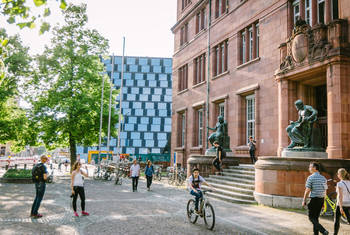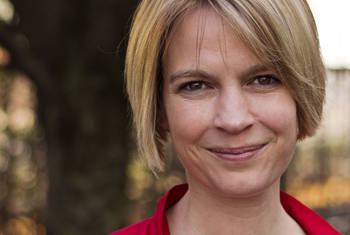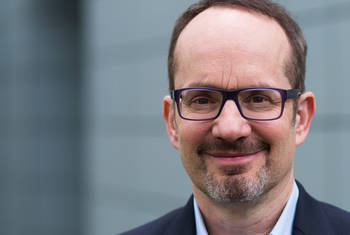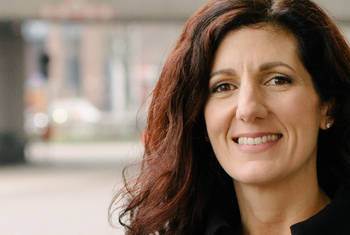Sven Diederichs Which Functions Do the Noncoding Parts of Human RNA Have in Metastasis Formation of Lung Cancer Cells?
Sven Diederichs is Group Leader of the division ‘Cancer Research’ at the Clinic for Thoracic Surgery, at the Albert-Ludwigs-University Freiburg, Germany. Diederichs spent three years (2005-2008) as a postdoctoral fellow at Harvard Medical School, working at the Massachusetts General Hospital Cancer Centre. For his research on cancer, Diederichs was awarded several prizes, including the 2014 Liver Cancer Research Award of the German Society for Gastrointestinal Diseases and Bayer Health Care and the Dr. Hella Bühler Prize in 2013. Diederichs’ specific interest lies in how the RNA gene Malat-1 can determine the occurrence of lung cancer with or without metastasis.
Area of Research
Molecular Biology: Cancer Research, RNA Biology
since 2016
Full Professor Division Head of the Division "Cancer Research"
Albert Ludwigs University of Freiburg (Albert-Ludwigs-Universität Freiburg) (more details)
Clinic for Thoracic Surgery, University Hospital Freiburg
since 2015
Division Head
German Cancer Research Center (DKFZ)
Of the Division "RNA Biology & Cancer"
2009-2014
Junior Group Leader of the Helmholtz-University-Junior Research Group
German Cancer Research Center (DKFZ)
And the Institute of Pathology, University of Heidelberg
2008-2014
Junior Group Leader
German Cancer Research Center (DKFZ)
2005-2008
Postdoctoral Fellow
Laboratory of Prof. Dr. Daniel A. Haber, Harvard Medical School/Massachusetts General Hospital Cancer Center, Boston
2004
PhD in Molecular Biology (Hematology/Ontology)
University of Münster (Westfälische Wilhelms-Universität Münster)
And the University of Witten/Herdecke
2002
Diploma in Biochemistry
University of Münster (Westfälische Wilhelms-Universität Münster)
Department of Medicine, Hematology/Oncology
- American Association for Cancer Research (AACR) (since 2003)
- GBM Study Group RNA Biochemistry (since 2006)
- German Society for Biochemistry & Molecular Biology (GBM) (since 2006)
- German Society for Pathology (DGP) (since 2010)
- RNA Society (since 2007)
Prizes
- Liver Cancer Research Award of the German Society for Gastrointestinal Diseases (DGVS) & Bayer Health Care (2014)
- Hella-Bühler-Preis (2013)
- Binder Innovation Prize of the German Society of Cell Biology (DGZ) (2012)
- Karl-Freudenberg-Preis of the Heidelberg Academy of Sciences and Humanities (2010)
- Presentation Award Miami Winter Symposium “Regulatory RNA in Biology and Human Health” (2008)
- Scholar-in-Training Award of the American Association for Cancer Research (AACR): “The Role of Non-Coding RNAs in Cancer” (2007)
- Young Investigator Award of the German Academy of Scientists Leopoldina (2005)
- PhD Thesis Award of the German Society for Hematology and Oncology (DGHO) (2005)
- Scholar-in-Training Award of the American Association for Cancer Research (AACR) / Pezcoller Foundation (2003)
Fellowships
- Member of "Die Junge Akademie" (2010-2015)
- PhD Scholarship Award of the German Academic Merit Foundation (Studienstiftung des deutschen Volkes) (2002-2004)
- Scholarship Award of the German Academic Merit Foundation (Studienstiftung des deutschen Volkes) (1997-2001)
- Member of the Selection Committee for the German Academic Merit Foundation (Studienstiftung des deutschen Volkes)
- Group Leader "Genetics & Genomics" in the Life Science College of the German Academic Merit Foundation (Studienstiftung des deutschen Volkes)
- Dr. Hella Bühler Prize for Cancer Research (2013)
 © Sandra Meyndt/University of Freiburg
© Sandra Meyndt/University of Freiburg

Albert Ludwigs University of Freiburg (Albert-Ludwigs-Universität Freiburg)
Founded in the 15th century, the University of Freiburg has a long-standing reputation of excellence in academic teaching and research. Among the most renowned university members were the philosophers Edmund Husserl and Martin Heidegger, the economist Walter Eucken, and such Nobel Prize winners as Hans Spemann, Hermann Staudinger, Georg von Hevesy, Friedrich August von Hayek and George Köhler. Today, with its mixture of traditional subjects and modern technology, the University of Freiburg is flourishing more than ever. The university and its hospital employ more than 19,000 staff members. Organized according to the classical model of a comprehensive university, it provides 25,000 students with a broad range of subjects – from applied information technology, the entire spectrum of medical specialities and natural sciences to the fields of humanities and social sciences. Freiburg’s research and teaching policies aim to overcome the barriers between individual disciplines to create opportunities for new perspectives on complex problems. By supporting collaborative research projects across boundaries and implementing centers of knowledge and interdisciplinary graduate colleges, the university provides the disciplines an effective means by which to benefit from each other’s knowledge.
An added benefit that comes with such flexibility is an increased international interest for our university: We are pleased to have a significant number of scientists and students from all over the world, whose culture-specific views of scientific procedures and research approaches enrich the dialog with their German counterparts. 16% of the student body are from foreign countries. The general international exchange of scientific results and experiences also plays an important role at the University of Freiburg. More than 300 partner universities and programs on five continents, together with the alumni association, form a first-class international network. (Source: University of Freiburg)
Map
Parts of the human RNA that are not translated into proteins may still have an important function. As SVEN DIEDERICHS explains in this video, the occurrence of the RNA gene Malat-1 makes the difference between lung cancer with and without metastasis. By first identifying Malat-1 as the molecular difference between patients and then silencing this RNA gene, it was found that Malat-1 could be a viable target to suppress development of metastasis in lung cancer therapy.
LT Video Publication DOI: https://doi.org/10.21036/LTPUB10072
The Noncoding RNA MALAT1 Is a Critical Regulator of the Metastasis Phenotype of Lung Cancer Cells
- Tony Gutschner, Monika Hämmerle, Moritz Eißmann, Jeff Hsu, Youngsoo Kim, Gene Hung, Alexey Revenko, Gayatri Arun, Marion Stentrup, Matthias Groß, Martin Zörnig, A. Robert MacLeod, David L. Spector et al
- Cancer Research
- Published in 2013
MALAT-1, a Novel Noncoding RNA, and Thymosin β4 Predict Metastasis and Survival in Early-Stage Non-Small Cell Lung Cancer
- Ping Ji, Sven Diederichs, Wenbing Wang, Sebastian Böing, Ralf Metzger, Paul M. Schneider, Nicola Tidow, Burkhard Brandt, Horst Buerger, Etmar Bulk, Michael Thomas, Wolfgang E. Berdel, Hubert Serve et al
- Oncogene
- Published in 2003
Noncoding RNA Gene Silencing Through Genomic Integration of RNA Destabilizing Elements Using Zinc Finger Nucleases
- Tony Gutschner, Marion Baas and Sven Diederichs
- Genome Research
- Published in 2011









